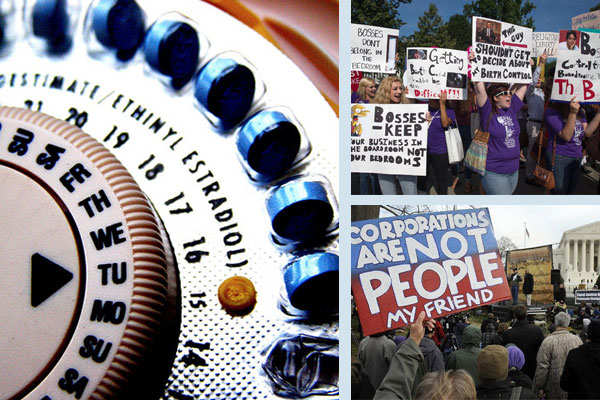
How the Hobby Lobby Decision Affects Us All
- By Krista R. Burdine --
- 02 Jul 2014 --

The Hobby Lobby decision has implications that reach much further than most predict.
Reactions run strong in the wake of this week’s Burwell v. Hobby Lobby decision, allowing the family owned craft-store giant to decline on religious grounds to completely follow the law of the land. Some claim it as a victory for people of faith everywhere, who want to preserve their right to be people of faith at work. However, the ripples may spread through the pond of life, liberty, and the pursuit of happiness further than was intended by those who dropped in the stone.
White House Press Secretary Josh Earnest on the Hobby Lobby Decision
To be fair, it sounds really good, this idea that a big company with the conscience of an individual cannot be forced to pay for something it considers immoral. That’s possibly all the Green family, owners of Hobby Lobby, wanted. It was to be expected that the Affordable Care Act (ACA), with its sweeping ambition to provide healthcare for every American, might need a little tweaking. But the ripples of this case extend beyond the freedom to not provide a certain contraception. That’s just the stone being thrown in the pond.
Corporate Personhood
One ripple of this decision has to do with the voice of the individual. Using the Religious Freedom Restoration Act, a law designed to protect individuals, this big company got to be a conscientious objector and opt out of full compliance with the ACA. Unfortunately, this comes at the cost of the rights of 15,000 individual employees of Hobby Lobby and Conestoga Wood (the other company included in this lawsuit), as well as the many thousands of individual employees represented by the 82 companies with similar objections that now have their permission, and potentially the employees of the 90% of companies in America that fall into the category of closely held company. All of these individuals now lack the full benefit of the Affordable Care Act, which was designed to benefit every individual American. And which of them has the greater resources to plead its case to the highest court in our land? The corporations.
Hobby Lobby accomplished this despite the fact that until the ACA was about to become law in 2012, it had offered the emergency contraceptives in question, Plan B and Ella, for years. When preparing for this lawsuit with services provided by the Becket Fund, they dropped these contraceptives from their coverage plan. What’s more, Hobby Lobby’s retirement plan generously matches employee contributions, to the tune of $3.8 million in 2012. The company’s total 401(k) investments include a wide range of holdings, but notably at least three quarters of the total portfolio–amounting to $73 million in investments–is in funds that include the manufacturers of the drugs they want to avoid supporting. Set against the list of ways the Green family claims they apply their religious beliefs to the company, and given that faith-based investing is an option for other conscientious corporate investors, this seems a significant inconsistency.
Precedent
Another significant ripple this decision creates is the precedent that has been set. Laws in our country come about because of precedent. First and foremost, this decision affects at least 82 other companies who already had similar cases in the courts, who now get to use this as permission to drop part of their coverage for employees. Further, companies that fall under the limiting definition of a closely held company(those with more than 50% of stock held by 5 or fewer individuals) include such giants as Mars Inc. and Cargill. So the Hobby Lobby decision sets a broader precedent than one might think.
On religious grounds, a company could potentially use the Hobby Lobby decision as precedent to argue that it can discriminate against providing coverage for gay spouses. As a nation we have come so far with civil rights in the past 50 years, are we to go back to a time of fewer rights for certain minorities? If a company owned by Jehovah’s Witnesses uses this precedent to withhold coverage for blood transfusions due to religious objections, or a Scientology-owned company withheld antidepressants, would this victory be worth it? Justice Ruth Ginsburg, in her dissenting opinion, voiced concerns that this is exactly where this precedent could lead.
The American Way
To salt this conversation with a little perspective, the Hobby Lobby decision does not spell doom for America as we know it, regardless of which way the decision went. As we move forward we will incorporate this decision into our national fabric. At the end of the day, America is a strong nation with a host of advocates on both sides of the political fence, who passionately work toward the same goals of life, liberty, and the pursuit of happiness.
But the concerns raised by this victory extend beyond freedom of religion. All Americans should be free to exercise or avoid religion. But when a corporation can claim the rights of an individual, then individual rights are diminished. It’s concerning that this corporation, a big guy if you will, was able to infringe on the right of individuals, the little guy, to receive less than the government’s full spectrum of benefits offered to every individual American. The further concern is that this precedent that may have further reaching effects than the Green family realized when they set this case in motion.
While those who claim to walk in Jesus’ footsteps do a victory dance, a disturbing set of ripples spreads through the pond, in which a corporate giant has permission to claim exemption from fully executing a law designed to watch out for the least of these, and corporation owners claiming anyreligious convictions–not just Christian–are equally given precedent to exercise their faith in the business world. I wonder if Jesus is happy now, too.


















